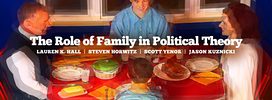Since the discussion has taken a practical turn, I’d like to delve a bit deeper into some of our concerns about how best to encourage a kind of moderate monogamy (as I call it) and take a look at how we can encourage or defend such monogamy without relying on government nudges or prohibitory laws.
We know that incentivizing marriage does not seem to do much. Both conservative and liberal think tanks bemoan the fact that there does not seem to be much government can do in a positive sense to encourage people to marry. But, of course, many people are getting married and staying together. Those people tend to be middle class individuals with college educations. The question is not how we get people to marry but why some groups marry and stay married so much more than others.
There are, of course, many ways in which the political system creates disincentives for marriage among people of the lower class. Some bemoan the welfare state as become a replacement for stable relationships, which may be true, but we are confronted with a chicken-and-egg problem. Do poor women eschew marriage because they can get welfare benefits, or do they end up on welfare because marriage is not possible in their current environment?
One part of the answer might be to take a closer look at sex ratios among lower class individuals. A cluster of facts leads to a somewhat startling conclusion. First, lower class men are failing at life at significantly higher levels than lower class women. They are less likely to get an education, less likely to have stable jobs, and more likely to engage in risky behavior like drug and alcohol addiction and criminal activity. The Economist recently had an entire issue devoted to this topic, and Hanna Rosin famously declared the End of Men five years ago. What this means for the family is that the pool of acceptable marriage partners is skewed. There are far more marriageable women than there are marriageable men in lower income brackets. Lower-income women, being perfectly capable of seeing patterns in their environment, may very well choose to have a child by a man without wanting to bank her financial and emotional future on a very uncertain investment. His genes may be good enough, but everything else will likely lead to a lot of trouble, particularly since marriage involves entangling economic alliances.
It’s not just the effect of the information economy on males that skews sex ratios. There are, by some estimates, as many as 1.5 million missing black males due to a combination of violence and incarceration. In some neighborhoods, this means there may be as many as 140 black women for every 100 black men. Monogamy is simply not possible under these circumstances. While Kay Hymowitz points out that the demise of the black family started well before mass incarceration, skewed sex ratios make any resurgence of the family among low-income communities nearly impossible. There just aren’t enough men to go around.
Imbalanced sex ratios impact the way men operate as well. When there is a glut of women in the mating pool, either because of incarceration or because there are too many unmarriagable men, the marriageable men have no incentive to commit. Men in these circumstances know women don’t have many options, so promiscuity and lack of commitment become the rulebook by which both sexes operate. Such a situation makes both men and women unhappy and less well off in the long run, but both sexes are stuck in prisoner’s dilemma created by sex ratio imbalances they may not even know exist.
If we care about the effect families have on the creation of stable political communities (and, as Jason points out, about families themselves) we need to discuss, as Steve has, the kinds of government policies that affect sex ratios, which in turn affect the decisions men and women make about marriage and reproduction.
A few proposals then. Eliminate drug policies that take men away from their families and that skew sex ratios, making monogamous pairing impossible. Provide more opportunities for working class men to get jobs. This may include eliminating or reducing certification and licensing laws that prevent people from entering various occupations that in themselves may require little formal education. While we’ve made it easier than ever to be incarcerated, we’ve also made it harder and harder to get a job or start a business. Re-emphasize the importance of skilled labor in middle and high schools. The emphasis on college degrees has pushed people away from skilled labor, despite the fact that in many parts of the country there is a serious dearth of skilled laborers to fill stable and well-paying jobs. Finally, reassess welfare benefits that create a marriage tax on the poor.
None of these suggestions will by themselves turn the boat of family dissolution around, but they could at least take the lock off the steering wheel. Without enough men to marry, stable marriage among lower-income people will continue to be mathematically impossible and the marriage gulf will continue to expand inequality between the lower and middle classes.

